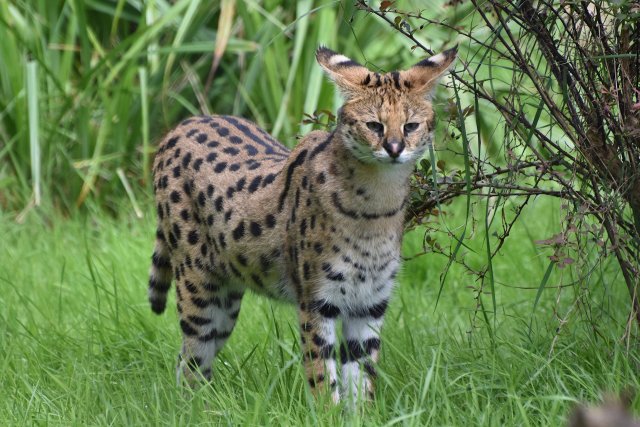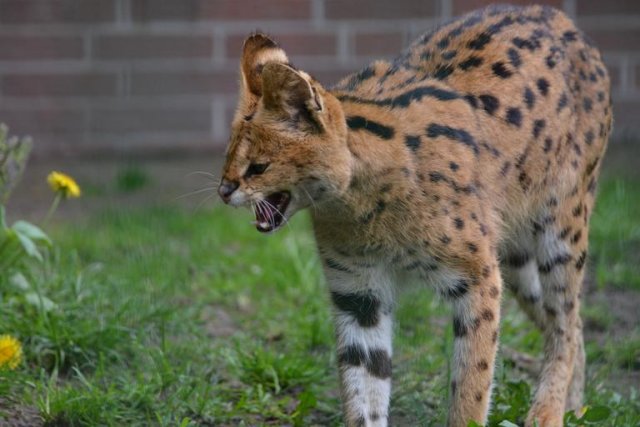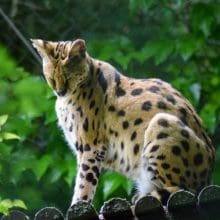Friendly Feline Species: Are Serval Cats Naturally Friendly Towards Humans?
The Enchanting World of Friendly Feline Species: Unveiling Their Fascinating Nature
Friendly Feline Species: When it comes to domesticated pets, cats have always been a popular choice for animal lovers. Their independent nature, playful demeanor, and affectionate behavior make them great companions. While most people are familiar with common cat breeds like the Persian or Siamese, there are other feline species that have gained attention in recent years. One such species is the Serval cat, known for its striking appearance and unique personality. In this article, we will explore whether Serval cats are naturally friendly towards humans or if their wild instincts make them less suitable as pets.
The Serval Cat: A Brief Introduction
The Serval cat (Leptailurus serval) is a medium-sized wild cat native to Africa. It is easily recognizable by its slender body, long legs, and large ears. Servals are primarily found in grasslands, savannas, and wetlands, where they hunt small mammals, birds, and reptiles. Due to their distinctive appearance and exotic charm, some people have expressed interest in keeping them as pets.
The Myth of Domestication
Friendly Feline Species: While Serval cats may appear similar to domesticated cats, it is important to note that they are still wild animals. Domestication is a long and complex process that involves selective breeding over generations to create animals that are more docile and adapted to living with humans. Unlike dogs or even some cat breeds, Servals have not undergone this domestication process.
It is crucial to understand that even if a Serval cat is born in captivity, it does not automatically make it a domesticated pet. These cats retain their wild instincts and behaviors, which can pose challenges when kept in a domestic environment.
Understanding the Serval Cat’s Behavior
To determine whether Serval cats are naturally friendly towards humans, it is essential to examine their behavior in the wild and in captivity. Servals are solitary animals that mark their territories and communicate through scent marking and vocalizations. They are highly skilled hunters and rely on their agility and keen senses to catch prey.
In captivity, Serval cats may exhibit different behaviors depending on their individual personalities and the quality of care they receive. Some individuals may show a certain level of friendliness towards their human caretakers, while others may remain aloof or even aggressive.
Friendly Feline Species: Factors Influencing Friendliness
Several factors can influence the friendliness of a Serval cat towards humans:
- Early Socialization: Serval cats that are exposed to humans from a young age and receive proper socialization are more likely to be comfortable around people.
- Individual Personality: Just like domesticated cats, Serval cats have unique personalities. Some may naturally be more friendly and sociable, while others may be more reserved or independent.
- Quality of Care: The level of care and attention a Serval cat receives can greatly impact its behavior. Cats that are well-cared for and provided with appropriate mental and physical stimulation are more likely to exhibit positive behaviors.
Case Studies and Experiences
Friendly Feline Species: While there are no extensive scientific studies on the friendliness of Serval cats towards humans, there are numerous anecdotal accounts from individuals who have owned or interacted with these animals.
One such case is the story of Scarlett, a Serval cat living in a wildlife sanctuary in South Africa. Scarlett was rescued as a young cub and raised by humans. Due to her early socialization and positive interactions with caretakers, she developed a friendly and affectionate personality. Scarlett enjoys human company and often seeks out attention and affection.
However, it is important to note that Scarlett’s case is not representative of all Serval cats. Each individual cat may have different experiences and temperaments, making it crucial to approach them with caution and respect their wild nature.
Legal and Ethical Considerations
Before considering owning a Serval cat, it is essential to understand the legal and ethical implications. In many countries, including the United States, owning a Serval cat as a pet is either heavily regulated or outright illegal. This is due to concerns about the welfare of the animals and the potential risks they pose to both humans and native wildlife.
due to concerns about the welfare of the animals and the potential risks they pose to both humans and native wildlife.
It is crucial to prioritize the well-being of these animals and support conservation efforts to protect their natural habitats. Instead of keeping them as pets, individuals can contribute to their conservation by supporting reputable wildlife sanctuaries and organizations.
Summary
Friendly Feline Species: Serval cats are fascinating creatures with their unique appearance and wild instincts. While some individuals may exhibit friendliness towards humans, it is important to remember that they are still wild animals and not suitable as domesticated pets. Factors such as early socialization, individual personality, and quality of care can influence their behavior, but their wild nature should always be respected.
Instead of attempting to keep Serval cats as pets, it is crucial to support conservation efforts and promote the well-being of these animals in their natural habitats. By appreciating them from a distance and contributing to their conservation, we can ensure the long-term survival of this magnificent species.
Read More About Servals From Wikipedia




